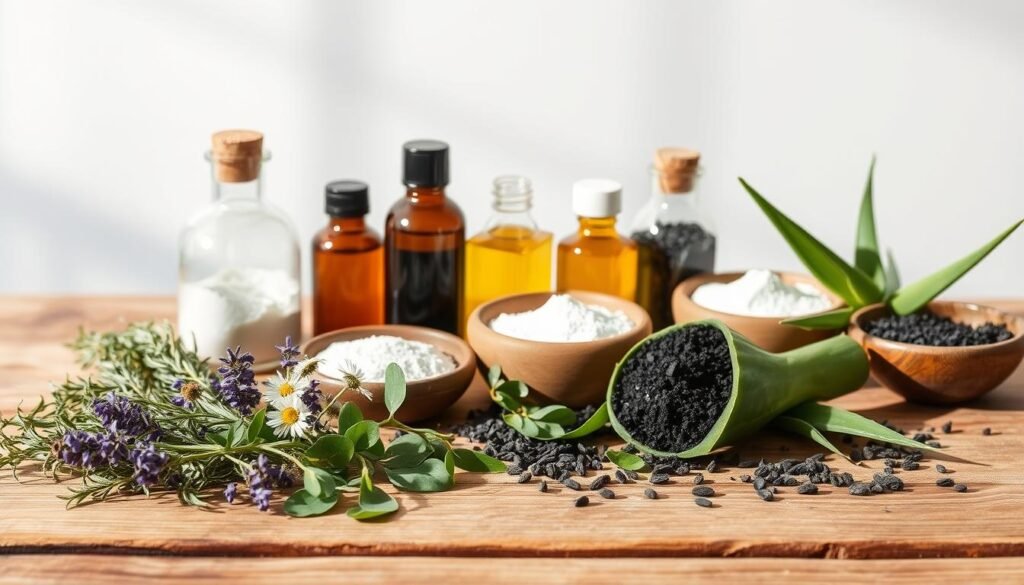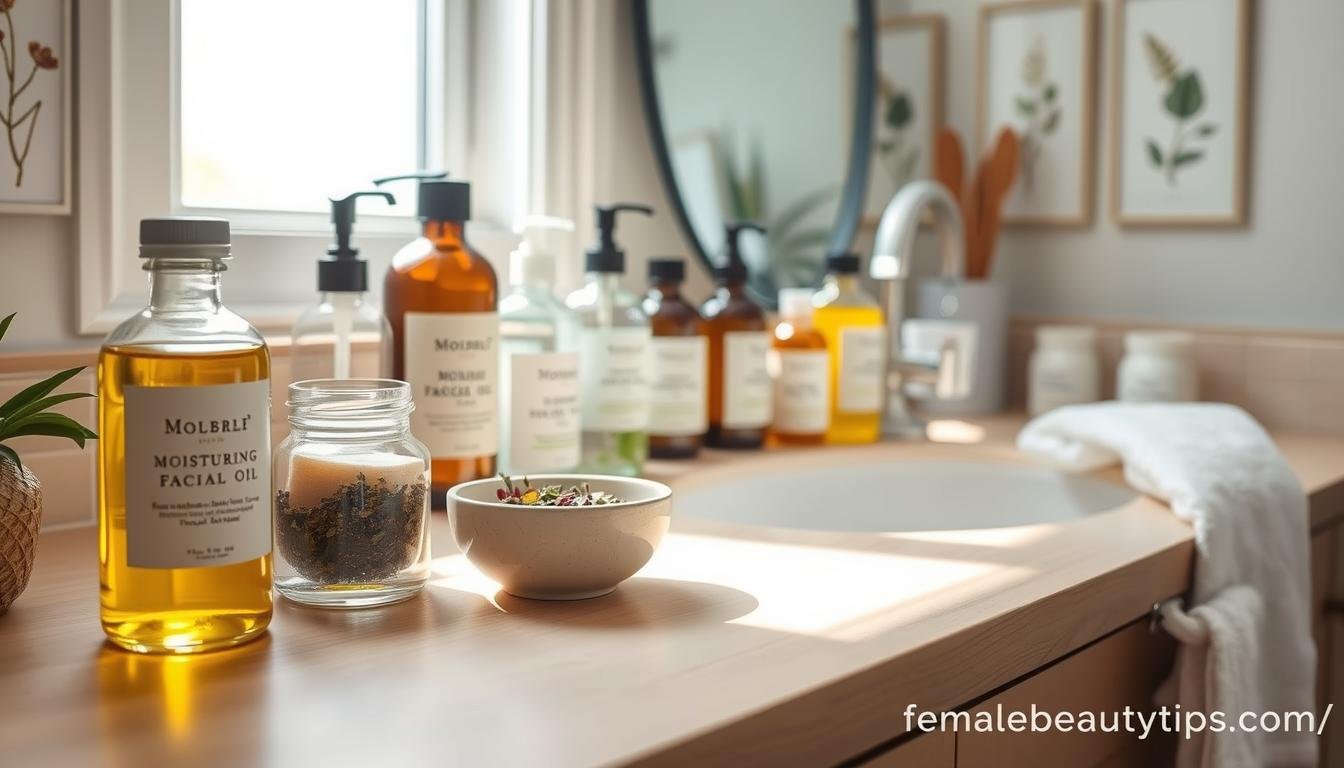Did you know that the average person uses around 12 personal care products daily, exposing their skin to over 168 chemicals? This staggering statistic highlights the importance of taking control of your skincare regimen. By adopting a natural skincare routine at home, you can avoid harsh chemicals and tailor your products to your specific skin needs.
Building a skincare routine using organic beauty products not only enhances your skin health but also promotes a clean beauty lifestyle. In this article, we’ll explore how to create a personalized skincare regimen using natural ingredients, helping you achieve healthier, glowing skin.
Key Takeaways
- Understand the benefits of a natural skincare routine
- Learn how to identify your skin type and needs
- Discover simple, effective natural skincare recipes
- Explore the importance of avoiding harsh chemicals in skincare products
- Create a personalized skincare regimen for healthier, glowing skin
Understanding Your Skin Type and Needs
Before diving into natural skincare, it’s essential to identify your skin type and its unique needs. This understanding will help you tailor a skincare routine that effectively addresses your skin concerns.
Different Skin Types Explained
Skin types generally fall into four categories: normal, dry, oily, and combination. Normal skin is balanced, neither too oily nor too dry. Dry skin often feels tight and may appear flaky, while oily skin is characterized by excess sebum production, leading to a shiny appearance. Combination skin is a mix, typically oily in the T-zone and normal to dry elsewhere.
How to Determine Your Skin Type
To determine your skin type, start with a clean face, free from any products. Wait for about an hour, then observe your skin. If it feels comfortable and not too oily or dry, you likely have normal skin. If it feels tight or appears flaky, you may have dry skin. Excess shine, especially in the T-zone, indicates oily skin. A combination of these characteristics suggests combination skin.

Common Skin Concerns and Natural Solutions
Common skin concerns include acne, aging, and hyperpigmentation. Natural solutions abound, such as tea tree oil for acne, rosehip oil for aging, and turmeric for hyperpigmentation. Understanding these concerns and their natural remedies can help you create a skincare routine that is both effective and gentle.
| Skin Concern | Natural Solution |
|---|---|
| Acne | Tea Tree Oil |
| Aging | Rosehip Oil |
| Hyperpigmentation | Turmeric |
By understanding your skin type and its needs, you can make informed choices about the natural ingredients and skincare products that will work best for you, paving the way for a healthy and effective skincare routine.
The Science Behind Natural Skin Care
The science behind natural skin care reveals the intricate balance between natural ingredients and skin health. Natural skincare is grounded in understanding how to work with the skin’s natural processes to achieve health and beauty.
Avoiding Harmful Chemicals
One of the core principles of natural skincare is avoiding harmful chemicals commonly found in commercial skincare products. Chemicals such as parabens, sulfates, and phthalates have been linked to various health concerns, including skin irritation and hormonal imbalances. Choosing natural skincare products means opting for formulations that are free from these harmful substances.

Environmental Impact of Natural Products
The environmental impact of natural skincare products is significantly lower compared to traditional skincare products. Sustainable sourcing of ingredients, eco-friendly packaging, and cruelty-free testing are some of the practices that define green beauty. By choosing natural and sustainable skincare, consumers support environmentally responsible practices.
| Aspect | Natural Skincare | Traditional Skincare |
|---|---|---|
| Ingredients | Natural, organic | Chemical-based |
| Environmental Impact | Sustainable, eco-friendly | Higher environmental footprint |
| Skin Health | Nourishing, gentle | Potential irritants, long-term damage |
Long-term Benefits for Skin Health
The long-term benefits of natural skincare for skin health are numerous. Natural ingredients work in harmony with the skin, promoting its natural barrier function and reducing the risk of irritation and other adverse reactions. Consistent use of natural skincare products can lead to healthier, more resilient skin over time.
By understanding the science behind natural skin care, individuals can make informed choices that benefit both their skin and the environment. Embracing natural skincare is a step towards a more sustainable and healthy beauty routine.
Essential Ingredients for Natural Skincare
The effectiveness of your natural skincare routine depends on the careful selection of ingredients that cater to your skin type and needs. Natural skincare products rely on a diverse range of ingredients, each offering unique benefits.
Plant-Based Oils and Butters
Plant-based oils and butters are staples in natural skincare due to their moisturizing and nourishing properties. Oils like coconut, olive, and jojoba are rich in antioxidants and essential fatty acids, promoting healthy skin. Butters, such as shea and cocoa, provide intense hydration and protection.

Botanical Extracts and Their Benefits
Botanical extracts are derived from plants and offer a range of benefits, from anti-inflammatory properties to antioxidant effects. Calendula extract, for instance, is known for its soothing properties, while green tea extract provides antioxidant protection. These extracts can be used to address various skin concerns, including acne, aging, and sensitivity.
Natural Preservatives and Antioxidants
Natural preservatives are crucial for extending the shelf life of skincare products without introducing harmful chemicals. Vitamin E and rosemary extract are examples of natural antioxidants that not only preserve products but also protect the skin from environmental stressors and oxidative damage.
By incorporating these essential ingredients into your natural skincare routine, you can create products that are both effective and gentle on your skin.
Setting Up Your Natural Skincare Workspace
A well-organized workspace is essential for crafting effective natural skincare products. Having a dedicated area for your skincare routine helps in maintaining cleanliness and efficiency.
Tools and Equipment You’ll Need
To start, you’ll need basic tools such as measuring cups, spoons, and mixing bowls. A digital scale is also crucial for accurate measurements. Additionally, consider investing in a blender or mixer for emulsifying products.
Creating a Clean and Organized Space
Maintaining a clean workspace is vital to prevent contamination. Ensure your area is well-ventilated and free from clutter. Organize your ingredients and tools in a way that makes them easily accessible.
Storage Solutions for Ingredients
Proper storage of ingredients is crucial to maintain their potency. Use airtight containers to store oils, butters, and extracts. Label each container to avoid confusion.
| Ingredient | Storage Container | Shelf Life |
|---|---|---|
| Coconut Oil | Airtight Glass Jar | 2 years |
| Shea Butter | Airtight Plastic Container | 3 years |
| Lavender Extract | Dark Glass Bottle | 1 year |

Transitioning from Commercial to Natural Skin Care
Transitioning from commercial to natural skin care products requires a thoughtful approach. As you embark on this journey, it’s essential to understand the benefits and challenges that come with making this switch.
Gradual Transition Strategies
To make the transition smoother, start by replacing one or two commercial products with natural alternatives. This could be as simple as switching to a natural moisturizer or cleanser. Gradually phase out other commercial products over time, allowing your skin to adjust.
- Begin with products that are easiest to replace, such as moisturizers or cleansers.
- Research natural alternatives to your favorite commercial products.
- Consider patch testing new natural products to ensure compatibility with your skin.
What to Expect During the Transition
During the transition, your skin may undergo a detox phase, which can manifest as breakouts or redness. This is a normal response as your skin adjusts to the new, natural ingredients. Be patient and give your skin time to adapt.
Tips for a smoother transition:
- Keep your skincare routine simple to minimize irritation.
- Avoid mixing too many new products at once.
- Stay hydrated and maintain a healthy diet to support skin health.
Identifying Natural Alternatives to Your Favorite Products
Finding natural alternatives to your favorite commercial products can be straightforward with a little research. Look for products that use natural preservatives and antioxidants. Consider the ingredient list and opt for products with minimal, recognizable ingredients.
By adopting a gradual transition strategy and being mindful of what you apply to your skin, you can successfully transition to a natural skincare routine that promotes healthy, glowing skin.
Morning Routine Essentials
Establishing a morning skincare routine is essential for achieving and maintaining radiant skin throughout the day. A consistent routine helps in removing overnight impurities, balancing skin pH, and preparing your skin for the day ahead.
Natural Cleansing Methods
Cleansing is the first step in any skincare routine. Natural cleansing methods involve using ingredients like honey, aloe vera, and gentle oils to clean the skin without stripping it of its natural oils. For instance, an oil cleansing method using coconut or olive oil can effectively remove dirt and makeup.
Alcohol-Free Toning Options
Toning helps balance the skin’s pH and tighten pores. Alcohol-free toning options, such as rose water or witch hazel, are gentle on the skin and effective in preparing it for subsequent products. These natural toners can help reduce inflammation and add a layer of hydration.
Daytime Moisturizing and Protection
Moisturizing is crucial for hydrating the skin and protecting it from environmental stressors. Using a natural moisturizer with SPF during the day can help protect your skin from UV damage. Ingredients like shea butter, jojoba oil, and green tea extract are excellent for daytime moisturizing.
| Skincare Step | Natural Ingredients | Benefits |
|---|---|---|
| Cleansing | Honey, Aloe Vera, Gentle Oils | Removes impurities without stripping natural oils |
| Toning | Rose Water, Witch Hazel | Balances skin pH, tightens pores |
| Moisturizing | Shea Butter, Jojoba Oil, Green Tea Extract | Hydrates and protects from environmental stressors |
By incorporating these natural skincare steps into your morning routine, you can achieve healthier, more radiant skin. Remember, consistency is key, and being gentle with your skin is paramount.
“The key to glowing skin is not just the products you use, but also the consistency of your skincare routine.”
Evening Routine Fundamentals
A well-crafted evening skincare routine is essential for repairing and rejuvenating your skin overnight. As you wind down, your skin goes into repair mode, making it the perfect time to apply products that nourish and rejuvenate.
Makeup Removal with Natural Ingredients
Removing makeup is the first step in your evening routine. Natural ingredients like coconut oil and olive oil are effective makeup removers. They dissolve makeup gently without stripping your skin of its natural oils. Simply massage the oil onto your face, rinse with warm water, and pat dry.
Deep Cleansing Techniques
After removing makeup, deep cleansing is crucial. Use a gentle cleanser that suits your skin type. For a deeper cleanse, consider using a clay-based cleanser or a cleansing balm. These products help remove dirt and impurities without harsh chemicals.
- Massage the cleanser onto your damp face.
- Rinse thoroughly with lukewarm water.
- Pat dry with a clean towel.
Overnight Treatments and Moisturizers
Overnight treatments and moisturizers are vital for hydrating and repairing your skin. Look for products containing hyaluronic acid, retinol, or plant extracts. These ingredients help lock in moisture, reduce fine lines, and promote skin regeneration.
- Apply a treatment serum or cream.
- Follow with a moisturizer to lock in the treatment.
- For an extra boost, use a facial oil or night mask.
By incorporating these steps into your evening routine, you’ll be giving your skin the care it needs to stay healthy and radiant.
DIY Natural Cleansers for Different Skin Types
With the right ingredients, you can craft effective natural cleansers tailored to your skin type. Natural ingredients offer a gentle and effective way to clean your skin without exposing it to harsh chemicals found in many commercial cleansers.
Oil Cleansing Method
The oil cleansing method is a popular technique for removing dirt and impurities from the skin without stripping it of its natural oils. This method involves using a combination of oils to cleanse the skin.
Benefits of Oil Cleansing:
- Gently removes dirt and makeup
- Balances skin’s natural oil production
- Can help reduce acne and blackheads
Honey-Based Cleansers
Honey is a natural humectant that attracts and retains moisture, making it an excellent ingredient for cleansers, especially for dry or sensitive skin.
Honey-Based Cleanser Recipe:
| Ingredient | Quantity |
|---|---|
| Honey | 2 tablespoons |
| Olive Oil | 1 tablespoon |
| Yogurt (optional) | 1 tablespoon |
Clay and Grain Cleansers
Clay and grain cleansers are excellent for exfoliating and detoxifying the skin. Kaolin clay is gentle and suitable for most skin types, while finer grains like oatmeal can help soothe and calm the skin.
Clay and Grain Cleanser Benefits:
- Exfoliates and removes dead skin cells
- Detoxifies and purifies the skin
- Can help improve skin texture and tone
Homemade Toners and Hydrosols
Creating your own toners and hydrosols at home can be a game-changer for your natural skincare routine. Toners help balance your skin’s pH, tighten pores, and prepare your skin for further products. Hydrosols, the byproduct of essential oil distillation, offer similar benefits with the added advantage of being gentle and fragrant.
Floral Waters and Their Benefits
Floral waters, or flower hydrosols, are not only soothing but also packed with benefits for the skin. Rose water, for example, is known for its anti-inflammatory properties and is suitable for all skin types. To make your own floral water, simply distill fresh flowers in water using a distillation apparatus. Chamomile and lavender are other popular choices, offering calming effects and a pleasant aroma.
Herbal Infusions for Toning
Herbal infusions can be used as toners, providing a gentle and effective way to care for your skin. To create an herbal infusion, steep your chosen herbs in boiling water, then strain and cool the mixture. Witch hazel is a popular choice for its astringent properties, while green tea offers antioxidant benefits.
| Herb | Benefit |
|---|---|
| Witch Hazel | Astringent, reduces pores |
| Green Tea | Antioxidant, anti-inflammatory |
| Calendula | Soothing, healing |
Apple Cider Vinegar Toners
Apple cider vinegar (ACV) is another natural ingredient that can be used as a toner. It helps balance the skin’s pH and can reduce acne. To make an ACV toner, mix one part ACV with two parts water. However, be cautious and start with a diluted solution to avoid irritation, especially if you have sensitive skin.
“The use of natural toners like apple cider vinegar and floral waters can significantly enhance your skincare routine, offering a chemical-free alternative to commercial products.”
By incorporating these homemade toners and hydrosols into your natural skincare routine, you can enjoy a more balanced, healthy complexion. Experiment with different ingredients to find what works best for your skin type.
Natural Exfoliation Methods
Natural exfoliation methods offer a gentle yet effective way to improve skin texture and appearance. Exfoliating your skin is crucial for removing dead skin cells, unclogging pores, and enhancing skin brightness.
Enzymatic Exfoliants
Enzymatic exfoliants use natural enzymes to break down dead skin cells. These are particularly beneficial for sensitive skin as they are gentle and non-abrasive. Examples include papain from papaya and bromelain from pineapple.
Gentle Physical Exfoliants
Gentle physical exfoliants, such as sugar, salt, and ground almonds, provide a mechanical means of removing dead skin cells. When used gently, these exfoliants can be effective without causing irritation.
Frequency and Best Practices
The frequency of exfoliation depends on skin type. Generally, exfoliating 1-3 times a week is recommended. It’s essential to follow up with a moisturizer after exfoliating to hydrate the skin.
| Skin Type | Exfoliation Frequency | Recommended Exfoliant |
|---|---|---|
| Normal | 2 times a week | Sugar or Salt Scrub |
| Sensitive | 1 time a week | Enzymatic Exfoliant |
| Dry | 1 time a week | Gentle Sugar Scrub |
By incorporating natural exfoliation methods into your skincare routine steps, you can achieve healthier, more radiant skin using natural ingredients found in various skincare products.
Creating Effective Natural Moisturizers
Crafting your own natural moisturizer allows you to tailor the ingredients to your specific skin needs, ensuring that you achieve the best results for your skin type. Natural skincare is not just about using products that are free from harsh chemicals; it’s also about understanding what your skin requires to stay healthy and hydrated.
Simple Oil Blends for Different Skin Types
One of the simplest ways to create a natural moisturizer is by blending different oils that cater to your skin type. For instance, if you have dry skin, you can mix jojoba oil with sweet almond oil to create a rich and nourishing moisturizer. On the other hand, if you have oily skin, a blend of grape seed oil and tea tree oil can help control sebum production while keeping your skin hydrated.
Water-Based Moisturizing Options
For those who prefer a lighter moisturizer, water-based options are an excellent choice. You can create a hydrating serum by mixing aloe vera gel with floral waters like rose or chamomile. This not only provides moisture but also soothes and calms the skin, making it ideal for sensitive skin types.
Butters and Balms for Intensive Hydration
Butters and balms are perfect for intensive hydration, especially during the colder months. Ingredients like cocoa butter and shea butter are rich in antioxidants and fatty acids, making them ideal for dry and damaged skin. By mixing these butters with natural oils and beeswax, you can create a protective balm that locks in moisture and protects your skin from environmental stressors.
By incorporating these natural ingredients into your skincare products, you can enjoy the benefits of organic beauty while maintaining healthy, hydrated skin. Whether you prefer oil blends, water-based serums, or rich butters and balms, there’s a natural moisturizer out there for everyone.
Natural Sun Protection Strategies
As we embrace natural skincare, understanding effective sun protection strategies becomes increasingly important. Protecting your skin from the sun’s harmful rays is crucial for maintaining healthy, youthful-looking skin and preventing premature aging.
Physical Sunblocks and Their Efficacy
Physical sunblocks, such as zinc oxide and titanium dioxide, work by creating a physical barrier on the skin’s surface that reflects and scatters UV radiation. These ingredients are considered effective for broad-spectrum sun protection.
Key Benefits of Physical Sunblocks:
- Immediate protection upon application
- Effective against both UVA and UVB rays
- Less likely to cause skin irritation compared to some chemical active ingredients
Supporting Ingredients for Sun Defense
In addition to physical sunblocks, certain natural ingredients can support sun defense by enhancing the skin’s resilience and promoting repair mechanisms. Antioxidants like vitamin E and plant extracts can help mitigate oxidative stress caused by UV exposure.
Limitations of Natural Sun Protection
While natural sun protection strategies can be effective, they also have limitations. For instance, physical sunblocks can be more visible on the skin, and some natural ingredients may not provide sufficient protection against intense or prolonged sun exposure.
| Sun Protection Method | Efficacy | Limitations |
|---|---|---|
| Zinc Oxide | High efficacy against UVA and UVB | Can be visible on skin |
| Titanium Dioxide | Effective against UVB and some UVA | May not be as effective for very fair skin |
| Antioxidant-rich extracts | Supports skin health and repair | Not a substitute for primary sun protection |
Understanding these limitations is crucial for developing a comprehensive sun protection strategy that combines natural ingredients with other protective measures.
Weekly Treatments to Enhance Your Routine
To take your natural skincare routine to the next level, consider adding weekly treatments tailored to your skin type. These treatments can help address specific skin concerns and improve overall skin health.
DIY Face Masks for Various Skin Concerns
DIY face masks are an excellent way to provide your skin with an intense dose of nourishment. For dry skin, a mask made from honey, avocado, and olive oil can be incredibly hydrating. Those with oily skin can benefit from a clay-based mask with tea tree oil to help control sebum production.
Here’s a simple recipe for a nourishing face mask:
| Ingredient | Quantity | Benefit |
|---|---|---|
| Honey | 2 tbsp | Moisturizes and soothes |
| Avocado | 1 mashed | Nourishes and hydrates |
| Olive Oil | 1 tbsp | Hydrates and protects |
Natural Steam Treatments
Natural steam treatments open up your pores, allowing for a deeper cleanse and better absorption of subsequent skincare products. Adding a few drops of lavender or chamomile essential oil can enhance the experience with their calming properties.
“Steam treatments are a simple yet effective way to rejuvenate your skin.”
Facial Massage Techniques
Facial massage not only relaxes the facial muscles but also improves blood circulation, which can help reduce the appearance of fine lines and wrinkles. Using a gentle, upward motion with your fingertips, massage your face for a few minutes to stimulate collagen production.
By incorporating these weekly treatments into your skincare routine, you can enjoy healthier, more radiant skin. Experiment with different treatments to find what works best for your skin type and concerns.
Addressing Specific Skin Concerns Naturally
A personalized natural skincare routine can effectively tackle various skin concerns, from acne to dryness. By understanding the root causes of skin issues and leveraging the power of natural ingredients, individuals can create targeted treatments that promote healthier, more resilient skin.
Acne and Blemish Solutions
For acne-prone skin, natural ingredients like tea tree oil and salicylic acid derived from willow bark can be highly effective. These ingredients help reduce inflammation and combat bacteria that cause acne. Incorporating a gentle exfoliating routine with natural alpha-hydroxy acids can also help prevent clogged pores.
Anti-Aging Ingredients and Formulations
Natural skincare products rich in antioxidants, such as vitamin C and E, can help combat signs of aging. These ingredients neutralize free radicals, reducing the appearance of fine lines and wrinkles. Formulations that include plant extracts like rosehip and green tea can also enhance skin elasticity and firmness.
Remedies for Dryness and Sensitivity
Dry and sensitive skin requires gentle, nourishing care. Natural moisturizers containing ingredients like hyaluronic acid, shea butter, and coconut oil can provide long-lasting hydration. For extremely dry skin, additional measures may be necessary.
Hydrating Ingredients for Extreme Dryness
Ingredients such as honey, glycerin, and ceramides can offer intense hydration for dry skin. These components help repair the skin’s barrier function, locking in moisture and protecting against environmental stressors.
Calming Botanicals for Reactive Skin
For reactive skin, calming botanicals like chamomile, aloe vera, and lavender can be soothing. These natural ingredients reduce redness and irritation, promoting a more balanced complexion.
| Skin Concern | Natural Ingredients | Benefits |
|---|---|---|
| Acne | Tea Tree Oil, Salicylic Acid | Reduces inflammation, combats acne-causing bacteria |
| Anti-Aging | Vitamin C, E, Rosehip Extract | Neutralizes free radicals, enhances skin elasticity |
| Dryness/Sensitivity | Honey, Glycerin, Chamomile | Provides hydration, soothes irritation |
By incorporating these natural ingredients and formulations into a skincare routine, individuals can effectively address specific skin concerns while promoting overall skin health.
Preserving and Storing Your Natural Skincare Products
To get the most out of your natural skincare products, it’s essential to understand how to preserve and store them properly. Natural ingredients can be more prone to degradation than synthetic ones, making proper handling crucial.
Understanding Shelf Life of Natural Products
Natural skincare products typically have a shorter shelf life compared to commercial products. This is because they often lack preservatives, which can extend product life but may also irritate the skin. The shelf life depends on the ingredients used and how the product is stored.
Factors Affecting Shelf Life:
- Exposure to air, light, and heat
- Contamination from utensils or hands
- Moisture levels
Natural Preservation Methods
Using natural preservatives is vital to extend the shelf life of your skincare products. Some effective natural preservatives include:
| Preservative | Benefits |
|---|---|
| Vitamin E | Antioxidant properties, protects against oil oxidation |
| Grapefruit Seed Extract | Antimicrobial properties, effective against a broad spectrum of microbes |
| Rosemary Extract | Antioxidant properties, helps in preserving the product’s potency |
Proper Storage Techniques
Proper storage is just as important as using the right preservatives. Here are some tips:
Keep products away from direct sunlight and heat sources. Use dark glass containers to protect products from light. Ensure containers are clean and dry before filling them with your skincare products. Always use clean utensils when scooping out product to prevent contamination.
By understanding the shelf life of your natural skincare products, using effective natural preservation methods, and storing them properly, you can enjoy the full benefits of your clean beauty products.
Conclusion
Building a natural skincare routine at home is a rewarding experience that requires patience, dedication, and the right knowledge. By understanding your skin type and needs, you can create a personalized routine that promotes healthy, glowing skin.
With the knowledge gained from this article, you’re now equipped to start your natural skincare journey. Begin by incorporating simple, natural ingredients into your daily routine, such as plant-based oils and botanical extracts, to experience the benefits of organic beauty.
As you transition to a natural skincare routine, remember to be gentle with your skin and allow it time to adjust. With consistent care and attention, you can achieve a radiant complexion that reflects your overall well-being. Start your natural skincare journey today and discover the transformative power of natural skincare.



